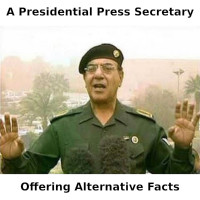λέγει αὐτῷ ὁ Πιλᾶτος τί ἐστιν ἀλήθεια;
Wednesday, 25 January 2017
Years ago, National Lampoon had a monthly column that they entitled True Facts
. The title was a joke, not because the contents weren't true (they were an assembly of extraödinary news reports), but because facts cannot be untrue; something untrue is not a fact. Yet many people in various contexts were using terms such as actual fact
, real fact
, and true fact
, almost as if it were possible for some facts to be false, imaginary, unreal. People still do, perhaps even more often. One can find lots of instances of people using imaginary fact
; sometimes they do so ironically, but more often they are quite serious. By imaginary fact
they mean a proposition that may be untrue, is likely to be untrue, or simply is untrue. In this retasking of the word fact
, they've lost the use of the word to talk about facts, unless they add a word such as true
. But, with that change in meaning, it not only becomes possible to use a term such as alternative fact
to refer to a rival claim, but it becomes harder to see that untrue rival claims don't have equal standing with true rival claims, as they are all supposedly facts
.
We aren't at all helped here that a great many people don't understand the words true
and truth
. That's not simply a problem of vocabulary. Truth is a hard concept, because it entails a meta-propositional act of mapping from a proposition back to itself. That is to say that, in most cases when we apply the word true
or equivalent and certainly in the case of true facts
, we are explicitly or implicitly making a proposition about a proposition. When we say It's true that I went to the store
, that actual referent of the grammatic subject is not I, but the proposition that I went to the store, yet the upshot of this sentence is merely what would be conveyed in saying I went to the store
. We perhaps don't need this device of recasting a proposition (I went to the store
) as a meta-proposition (It is true that I went to the store
), but it is useful because we are not omniscient, and must entertain propositions that are uncertain or discovered to be false; the concept of truth complements the conditions of falsehood and of uncertainty. Yet it is very hard to see that function, exactly because we use the concept to discuss itself. Truth is more easily named than described, if indeed a description is possible.
The difficulty in understanding the nature of truth makes it psychologically easier to embrace such notions as that all aspects of of past, present, and future are simply artefacts of individual belief or of group belief (expressed with formulæ such as truth is a social construct
) or that what one wants or ought to want is to be treated a true. The word fact
may then be used for components of narratives; embracing one narrative is seen as licensing one to accept propositions as fact that are alternative to components of rival narratives, and to reject propositions for no better reason than that they participate in rival narratives. Evolution of narratives is seen as licensing one to change the status of a proposition from fact
to falsehood
, or vice versa, even when discussing history. And we may even observe those socially identified as fact-checkers
testing claims against narratives which are themselves never fact-checked, because the checkers implictly treat their favored narratives as the ultimate determinant of fact
.
When Pilate asked What is truth?
, perhaps he was truly curious as to the nature of truth, but he may merely have been asking why he should give a damn about it. Our political leaders have become ever more disdainful of truth. They have long offered us alternative facts
, and their followers in each of our major political tribes and in most of the smaller groups as well have decided that, for them, these are the facts. Now we have an Administration that does so more baldly and less artfully. One might hope that this practice will explode on them; but, even if that explosion should happen, their opponents are likely to see an expansion of the envelope within which they may disregard the facts.


